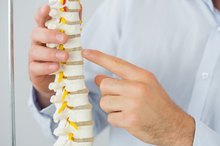Natural Herbal Treatments and Vitamins for Cervical Cancer
Cervical cancer is a type of cancer that affects women. This type of cancer is often detected during routine pap smears and tends to be slow-growing. It is usually caused by the human papilloma virus, which enters your body during sexual intercourse and spreads throughout your reproductive system. Symptoms may include a bloody vaginal discharge; irregular vaginal bleeding between menstrual periods, following sexual intercourse or during menopause; loss of appetite; severe fatigue; pelvic pain or back pain. Certain herbs and vitamins can help manage cervical cancer, ease cervical cancer symptoms and encourage healing.
If you are experiencing serious medical symptoms, seek emergency treatment immediately.
Vitamin A
Vitamin A is a fat-soluble vitamin that improves immune system function and protects your cervix from harmful free radicals that can cause precancerous and cancerous cells on the surface of your cervix, according to Tori Hudson, author of the book "Women's Encyclopedia of Natural Medicine: Alternative Therapies and Integrative Medicine for Total Health and Wellness." Foods rich in vitamin A include:
- turkey liver
- duck
- lamb
- broccoli
- apples
- spinach
- tomatoes
- peaches
- kale
- peas
- apricots
Vitamin B-2
Vitamins for an Overactive Bladder
Learn More
Vitamin B-2, also known as riboflavin, is a water-soluble vitamin that prevents precancerous or cancerous cells from developing on your cervix, repairs damaged cervical tissues, decreases cervical and reproductive system inflammation, eradicates the human papilloma virus and lowers your risk of cervical dysplasia, abnormal cells on the surface of your cervix that can lead to cervical cancer in some women, according to the World Health Organization's book “Comprehensive Cervical Cancer Control: A Guide to Essential Practice.” Foods rich in vitamin B-2 include:
- liver
- fortified breakfast cereals
- mushrooms
- eggs
- almonds
- milk
- sardines 2
Cat's Claw
Cat’s claw is available in teas, liquid extracts and capsules.
Turmeric
Vitamins for Mononucleosis
Learn More
Related Articles
References
- “Cervical Cancer: From Etiology to Prevention”; Thomas E. Rohan and Keerti V. Shah; 2004
- “Comprehensive Cervical Cancer Control: A Guide to Essential Practice”; World Health Organization; 2006
- “Women's Encyclopedia of Natural Medicine: Alternative Therapies and Integrative Medicine for Total Health and Wellness”; Tori Hudson; 2007
- “Complementary Oncology: Adjunctive Methods in the Treatment of Cancer”; Josef Beuth, Ralph W. Moss and Ulrich Abel; 2006
- “Alternative Treatment for Cancer”; Ping-Chung Leung and Harry Fong; 2007
- Denny L, Herrero R, Levin C, et al. Cervical Cancer. In: Gelband H, Jha P, Sankaranarayanan R, et al., editors. Cancer: Disease Control Priorities, Third Edition (Volume 3). Washington (DC): The International Bank for Reconstruction and Development / The World Bank; 2015 Nov 1. Chapter 4. Available from: https://www.ncbi.nlm.nih.gov/books/NBK343648/doi: 10.1596/978-1-4648-0349-9_ch4
- Fowler JR, Jack BW. Cancer, Cervical. [Updated 2019 Sep 9]. In: StatPearls [Internet]. Treasure Island (FL): StatPearls Publishing; 2019 Jan-. Available from: https://www.ncbi.nlm.nih.gov/books/NBK431093/
- Centers for Disease Control and Prevention. Cervical Cancer is Preventable.
- InformedHealth.org [Internet]. Cologne, Germany: Institute for Quality and Efficiency in Health Care (IQWiG); 2006-. Cervical cancer: Human papillomaviruses (HPV) 2012 Nov 21 [Updated 2017 Dec 14]. Available from: https://www.ncbi.nlm.nih.gov/books/NBK279260/
- Ferreira da Silva I, Ferreira da Silva I, Koifman RJ. Cervical Cancer Treatment Delays and Associated Factors in a Cohort of Women From a Developing Country. J Glob Oncol. 2019;5:1–11. doi:10.1200/JGO.18.00199
- Salih MM, AlHag FTES, Khalifa MA, El Nabi AH. Cervical cytopathological changes among women with vaginal discharge attending teaching hospital. J Cytol. 2017;34(2):90–94. doi:10.4103/JOC.JOC_214_15
- Donovan KA, Boyington AR, Judson PL, Wyman JF. Bladder and bowel symptoms in cervical and endometrial cancer survivors. Psychooncology. 2014;23(6):672–678. doi:10.1002/pon.3461
- Fetcko K, Gondim DD, Bonnin JM, Dey M. Cervical cancer metastasis to the brain: A case report and review of literature. Surg Neurol Int. 2017;8:181. Published 2017 Aug 9. doi:10.4103/sni.sni_111_17
- Göktuğ kadıoğlu B, Çınar tanrıverdi E, Alay H, Uçar M. [Relation of cervical cancer with the results of human papillomavirus (HPV) screening carried out via hybrid capture 2 method on 52.000 women in Erzurum]. Mikrobiyol Bul. 2018;52(4):367-375.
- American Cancer Society, Key Statistics for Cervical Cancer, cancer.org January 8. 2019
- Bansal A, Singh M, Rai B. Human papillomavirus-associated cancers: A growing global problem. Int J Appl Basic Med Res. 2016;6(2):84-9. doi:10.4103/2229-516X.179027
- Kashyap N, Krishnan N, Kaur S, Ghai S. Risk Factors of Cervical Cancer: A Case-Control Study. Asia Pac J Oncol Nurs. 2019;6(3):308–314. doi:10.4103/apjon.apjon_73_18
- Comprehensive Cervical Cancer Control: A Guide to Essential Practice. 2nd edition. Geneva: World Health Organization; 2014. 1, Background.Available from: https://www.ncbi.nlm.nih.gov/books/NBK269623/
- Cooper DB, McCathran CE. Cervical Dysplasia. [Updated 2019 Feb 20]. In: StatPearls [Internet]. Treasure Island (FL): StatPearls Publishing; 2019 Jan-. Available from: https://www.ncbi.nlm.nih.gov/books/NBK430859/
- Comparetto C, Borruto F. Cervical cancer screening: A never-ending developing program. World J Clin Cases. 2015;3(7):614-24.
- Li H, Wu X, Cheng X. Advances in diagnosis and treatment of metastatic cervical cancer. J Gynecol Oncol. 2016;27(4):e43. doi:10.3802/jgo.2016.27.e43
- Bates CK, Carroll N, Potter J. The challenging pelvic examination. J Gen Intern Med. 2011;26(6):651–657. doi:10.1007/s11606-010-1610-8
- Ashtarian H PhD, Mirzabeigi E Bs, Mahmoodi E Bs, Khezeli M PhD. Knowledge about Cervical Cancer and Pap Smear and the Factors Influencing the Pap test Screening among Women. Int J Community Based Nurs Midwifery. 2017;5(2):188–195.
- Reyes MC, Cooper K. Cervical cancer biopsy reporting: a review. Indian J Pathol Microbiol. 2014;57(3):364-8.
- Bourgioti C, Chatoupis K, Moulopoulos LA. Current imaging strategies for the evaluation of uterine cervical cancer. World J Radiol. 2016;8(4):342–354. doi:10.4329/wjr.v8.i4.342
- Ronnett BM, Manos MM, Ransley JE, et al. Atypical glandular cells of undetermined significance (AGUS): cytopathologic features, histopathologic results, and human papillomavirus DNA detection. Hum Pathol. 1999;30(7):816-25.
- Pecorelli S, Odicino F. Cervical cancer staging. Cancer J. 2003;9(5):390-4.
- Straughn Michael J, Yashar Catheryn. Patient Education: Cervical cancer treatment; early-stage cancer (Beyond the Basics). uptodate.com September 2019
- Šarenac T, Mikov M. Cervical Cancer, Different Treatments and Importance of Bile Acids as Therapeutic Agents in This Disease. Front Pharmacol. 2019;10:484. Published 2019 Jun 4. doi:10.3389/fphar.2019.00484
- Li H, Wu X, Cheng X. Advances in diagnosis and treatment of metastatic cervical cancer. J Gynecol Oncol. 2016;27(4):e43.
- D'Alessandro P, Arduino B, Borgo M, et al. Loop Electrosurgical Excision Procedure versus Cryotherapy in the Treatment of Cervical Intraepithelial Neoplasia: A Systematic Review and Meta-Analysis of Randomized Controlled Trials. Gynecol Minim Invasive Ther. 2018;7(4):145–151. doi:10.4103/GMIT.GMIT_56_18
- Mishra GA, Pimple SA, Shastri SS. An overview of prevention and early detection of cervical cancers. Indian J Med Paediatr Oncol. 2011;32(3):125–132. doi:10.4103/0971-5851.92808
- Lowy DR, Solomon D, Hildesheim A, Schiller JT, Schiffman M. Human papillomavirus infection and the primary and secondary prevention of cervical cancer. Cancer. 2008;113(7 Suppl):1980–1993. doi:10.1002/cncr.23704
- Lei J, Ploner A, Elfstrom KM, et al. HPV Vaccination and the Risk of Invasive Cervical Cancer. N Engl J Med. 2020;383:1340-1348. doi:10.1056/NEJMoa1917338
- Fonseca-Moutinho JA. Smoking and cervical cancer. ISRN Obstet Gynecol. 2011;2011:847684. doi:10.5402/2011/847684
- American Cancer Society, Key Statistics for Cervical Cancer, last revised January 4. 2018, Accessed June 1, 2018
- Pedersen K, Fogelberg S, Thamsborg LH, et al. An overview of cervical cancer epidemiology and prevention in Scandinavia. Acta Obstet Gynecol Scand. 2018 Feb 1. doi: 10.1111/aogs.13313.
- Perkins RB, Guido RS, Castle PE, et al. 2019 ASCCP Risk-Based Management Consensus Guidelines for Abnormal Cervical Cancer Screening Tests and Cancer Precursors. J Low Genit Tract Dis. 2020;24(2):102-131. doi:10.1097/LGT.0000000000000525
- Saeed M, Alshammari FD, Alam MJ, et al. A synopsis on the role of human papilloma virus infection in cervical cancer. Curr Drug Metab. 2018 Mar 2. doi: 10.2174/1389200219666180302160317.
Writer Bio
R. Y. Langham served as a senior writer for "The Herald" magazine from 1996-99. Langham holds a Bachelor of Arts in English from Fisk University, a Master of Science in marriage and family therapy from Trevecca Nazarene University and a Ph.D in family psychology from Capella University. Dr. R.Y. Langham published her first psychological thriller in September 2011. It can be purchased on Amazon.com, Barnes&Noble.com and Lulu.com.









